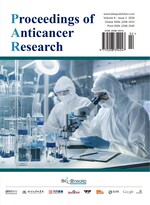Abstract
Objective: To investigate the factors affecting the quality of life of cancer patients by examining the degree of the COVID-19 pandemic-related depression, anxiety, stress, and treatment crisis. Methods: Data were collected from 132 cancer patients undergoing surgery, chemotherapy, radiotherapy, and hormone therapy at K University Hospital in D City using a structured questionnaire. The period of data collection was from May 6 to May 28, 2022. The collected data were analyzed using descriptive statistics, t-test, ANOVA, Pearson’s correlation, and stepwise multiple regression. Results: The mean scores of quality-of-life, depression, anxiety, stress, and treatment crisis during the COVID-19 pandemic were 84.64 ± 29.09, 15.14 ± 6.49, 4.66 ± 5.27, 75.83 ± 17.70, and 78.52 ± 19.95, respectively. In terms of factors affecting the quality of life related to the COVID-19 pandemic, COVID-19 pandemic-related stress (β = 0.41, P < 0.001) appeared to have the greatest impact, followed by COVID-19 pandemic-related treatment-crisis (β = 0.28, P = 0.002), anxiety (β = 0.21, P = 0.002), and gender (β = 0.14, P = 0.009), with a total explanatory power of 67.6%. Conclusion: To improve the quality of life during the COVID-19 pandemic, COVID-19 pandemic-related stress, treatment-crisis, and anxiety should be periodically monitored and nursing interventions such as education on infection prevention, management, and emotional support programs should be provided to decrease the COVID-19 pandemic-related stress, treatment-crisis, and anxiety.
References
World Health Organization (WHO), Numbers at a Glance, viewed September 26, 2022, http://www.who.int/emergencies/diseases/novel-coronavirus-2019
Kim J, Kang J, 2021, Who is to Blame for Infection? Emotional Discourse in Editorial Articles during the Emerging Infectious Diseases Epidemics in Korea. J Korea Contents Assoc, 12: 816–827.
Kimhi S, Eshel Y, Marciano H, et al., 2020, Distress and Resilience in the Days of COVID-19: Comparing Two Ethnicities. Int J Environ Res Public Health, 17(11): 3956. https://doi.org/10.3390/ijerph17113956
Lee DH, Kim YJ, Lee DH, et al., 2020, The Influence of Public Fear, and Psycho-Social Experiences During the Coronavirus Disease 2019 (COVID-19) Pandemic on Depression and Anxiety in South Korea. Korean J Couns Psychother, 32: 2119–2156.
Kim HA, 2021, The Effects of Illness Attitude on Quality of Life in the COVID-19 Era, thesis, Hanyang University.
Salari N, Hosseinian-Far A, Jalali R, et al., 2020, Prevalence of Stress, Anxiety, Depression Among the General Population During the COVID-19 Pandemic: A Systematic Review and Meta-Analysis. Global Health, 16(1): 57. https://doi.org/10.1186/s12992-020-00589-w
Wang C, Pan R, Wan X, et al., 2020, A Longitudinal Study on the Mental Health of General Population During the COVID-19 Epidemic in China. Brain Behav Immun, 87: 40–48. https://doi.org/10.1016/j.bbi.2020.04.028
Pitman A, Suleman S, Hyde N, et al., 2018, Depression and Anxiety in Patients with Cancer. BMJ, 361: k1415. https://doi.org/10.1136/bmj.k1415
Madkhali NA, Ameri A, Al-Naamani ZY, et al., 2022, Has the COVID-19 Pandemic Affected the Psychological State of Arab Cancer Patients? Curr Psychol, 21: 1–12. https://doi.org/10.1007/s12144-022-03414-2
Chen G, Wu Q, Jiang H, et al., 2020, Fear of Disease Progression and Psychological Stress in Cancer Patients Under the Outbreak of COVID-19. Psychooncology, 29(9): 1395–1398. https://doi.org/10.1002/pon.5451
Miaskowski C, Paul SM, Snowberg K, et al., 2020, Stress and Symptom Burden in Oncology Patients During the COVID-19 Pandemic. J Pain Symptom Manage, 60(5): e25–e34. https://doi.org/10.1016/j.jpainsymman.2020.08.037
Park HY, 2021, Mental Health in Patients with Coronavirus Disease-19 and the Quarantined People. J Korean Neuropsychiatr Assoc, 60: 11–18.
Ci??y?ska M, Pabianek M, Szczepaniak K, et al., 2020, Quality of Life of Cancer Patients During Coronavirus Disease (COVID-19) Pandemic. Psychooncology, 29(9): 1377–1379. https://doi.org/10.1002/pon.5434
Choi HK, 2021, Factors Influencing Health-Related Quality of Life of Pregnant Women: A Comparative Study. J Korean Data Inf Sci Soc, 32: 501–514.
Lovibond PF, Lovibond SH, 1995, The Structure of Negative Emotional States: Comparison of the Depression Anxiety Stress Scales (DASS) with the Beck Depression and Anxiety Inventories. Behav Res Ther, 33(3): 335–343. https://doi.org/10.1016/0005-7967(94)00075-u
Narigele N, Bae SY, 2021, The Impact of Depression from COVID-19 and Career Anxiety on Career Indecision among College Students Majoring in Hospitality and Tourism. Journal of Tourism and Leisure Research, 33(7): 275–291. https://doi.org/10.31336/jtlr.2021.7.33.7.275
Lee SA, 2020, Coronavirus Anxiety Scale: A Brief Mental Health Screener for COVID-19 Related Anxiety. Death Stud, 44(7): 393–401. https://doi.org/10.1080/07481187.2020.1748481
Lee R, 2021, Factors Related to COVID-19 Anxiety and Stress: Focusing on Demographic Characteristics and Neighborhood Satisfaction. J Korea Contents Assoc, 21: 71–80.
Taylor S, Landry CA, Paluszek MM, et al., 2020, Development and Initial Validation of the COVID Stress Scale for Korean People. J Anxiety Disord, 72: 102232. https://doi.org/10.1016/j.janxdis.2020.102232
Moraliyage H, De Silva D, Ranasinghe W, et al., 2021, Cancer in Lockdown: Impact of the COVID-19 Pandemic on Patients with Cancer. Oncologist, 26: e342–e344. https://doi.org/10.1002/onco.13604
Min SK, Kim KI, Lee CI, et al., 2002, Development of the Korean Versions of WHO Quality of Life Scale and WHOQOL-BREF. Qual Life Res, 11(6): 593–600. https://doi.org/10.1023/a:1016351406336
Lee ER, 2021, Changes in the Quality of Life of University Students in Daegu and Gyeongbuk in the Epidemic of COVID-19: The Relationship with COVID-19 Stress, Neuroticism, Anxiety Control, thesis, Daegu University.
Ji HY, 2022, Effects of Post-Traumatic Stress Disorder (PTSD): Social Stigma and Social Support on COVID-19 Survivors’ Quality of Life, thesis, Incheon Catholic University.
Kim SY, Kang JS, 2022, Factors Influencing COVID-19 Stress Among Tertiary Hospital Workers. Stress, 30: 252–259.
Villarreal-Garza C, Vaca-Cartagena BF, Becerril-Gaitan A, et al., 2021, Attitudes and Factors Associated with COVID-19 Vaccine Hesitancy Among Patients with Breast Cancer. JAMA Oncol, 7(8): 1242–1244. https://doi.org/10.1001/jamaoncol.2021.1962
de Joode K, Dumoulin DW, Engelen V, et al., 2020, Impact of the Coronavirus Disease 2019 Pandemic on Cancer Treatment: The Patients’ Perspective. Eur J Cancer, 136: 132–139. https://doi.org/10.1016/j.ejca.2020.06.019
Byun JY, 2021, Impact of the COVID-19 Pandemic on the Utilization of Medical Care Services, thesis, Seoul National University.
Choi E, Kim SH, Lee YW, et al., 2021, Supportive Care Needs and Health-Related Quality of Life of Esophageal Cancer Survivors. Asia Pac J Oncol Nurs, 8: 164–171. https://doi.org/10.4103/apjon.apjon_60_20
Korean Society of Critical Care Medicine, Notification Website, viewed December 1, 2021, https://www.ksccm.org/html/?pmode=BBBS0006700005&smode=view&seq=2560
Ministry of Health and Welfare (KR), The Results of the COVID-19 National Mental Health Survey in the Second Quarter of 2022 are Announced, viewed March 10, 2023, http://www.mohw.go.kr/react/al/sal0301vw.jsp?PAR_MENU_ID=04&MENU_ID=0403&page=1&CONT_SEQ=372545
